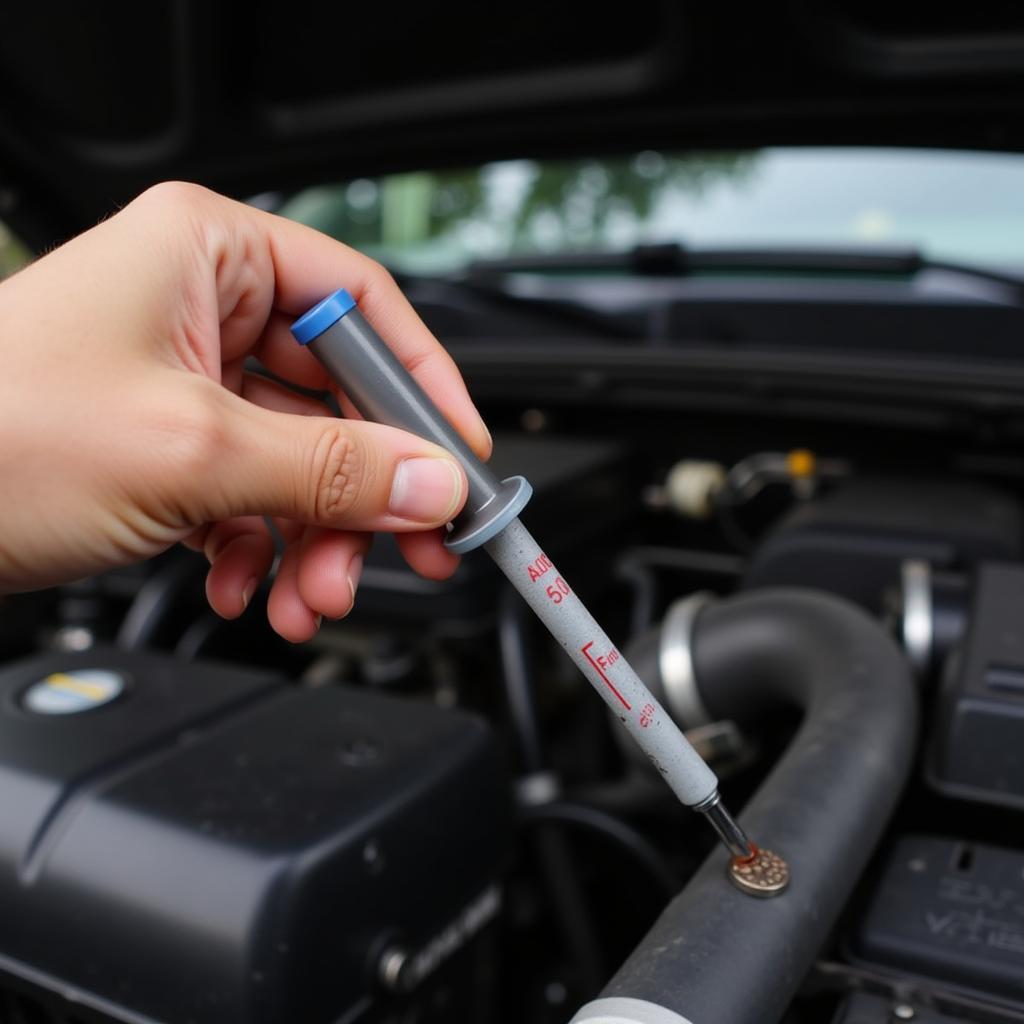Car starting problems can be frustrating and inconvenient. Whether it’s a clicking sound, a slow crank, or complete silence, understanding the root cause is the first step to getting back on the road. This guide covers the most Typical Car Starting Problems and provides solutions for car owners, mechanics, and technicians.
Common Causes of Car Starting Problems
Several factors can contribute to car starting problems, ranging from simple issues like a dead battery to more complex problems with the starter motor or ignition system. Let’s explore some of the most common culprits.
Dead Battery
Perhaps the most frequent cause of starting issues, a dead battery can result from leaving lights on, extreme temperatures, or simply old age. Symptoms include dimming headlights, slow cranking, and clicking sounds. Jump-starting the car can be a temporary fix, but getting the battery tested and replaced if necessary is crucial.
Faulty Starter Motor
The starter motor is responsible for cranking the engine. If it malfunctions, the engine won’t turn over. Common symptoms of a bad starter include a grinding noise when starting, a single click when turning the key, or no sound at all. Testing the starter motor requires some mechanical knowledge, so consulting a mechanic might be necessary.
Ignition System Issues
The ignition system provides the spark needed to ignite the fuel in the engine. Problems with the ignition switch, ignition coil, or spark plugs can prevent the engine from starting. Symptoms include the engine cranking but not starting, backfiring, or a rough idle. Diagnosing ignition system issues can be complex, so professional help is often recommended.
Fuel System Problems
A lack of fuel or issues with the fuel pump, fuel filter, or fuel injectors can also prevent the car from starting. If the engine cranks but doesn’t start, and you don’t smell any fuel, there might be a problem with the fuel delivery system. Checking the fuel gauge, listening for the fuel pump when the key is turned, and inspecting the fuel filter are good starting points.
Troubleshooting Typical Car Starting Problems
What should you do when faced with typical car starting problems? Here’s a step-by-step guide:
- Check the Battery: Try jump-starting the car. If it starts, the battery is likely the problem. Get it tested and replaced if needed.
- Inspect the Starter: Listen for unusual noises when starting. A grinding or clicking sound could indicate a faulty starter motor.
- Examine the Ignition System: If the engine cranks but doesn’t start, suspect an ignition problem. Consider checking the spark plugs and ignition coil.
- Investigate the Fuel System: If you don’t smell fuel when trying to start, check the fuel gauge, listen for the fuel pump, and inspect the fuel filter.
- Seek Professional Help: If you can’t identify the problem, it’s best to consult a qualified mechanic.
“A systematic approach to troubleshooting is essential for efficiently diagnosing car starting problems,” says automotive expert, John Miller, ASE Certified Master Technician. He adds, “Starting with the most common causes and progressively checking other components can save time and money.”
Why Won’t My Car Start When I Turn the Key?
This is a frequent question among car owners. The reasons can vary, but the most likely culprits include a dead battery, a faulty starter, or problems with the ignition system.
How Do I Know if My Starter is Bad?
Common signs of a bad starter include a clicking sound when turning the key, a grinding noise when starting, or the engine not turning over at all.
Can a Bad Alternator Cause Starting Problems?
While a bad alternator won’t directly prevent the car from starting initially, it can drain the battery over time, eventually leading to starting problems. “A healthy alternator is crucial for maintaining a charged battery and ensuring reliable starting,” notes automotive engineer, Sarah Chen, specializing in electrical systems.
Conclusion
Typical car starting problems can range from simple to complex. By understanding the common causes and following a systematic troubleshooting approach, you can effectively diagnose and resolve these issues. Don’t hesitate to reach out to a qualified mechanic for assistance if needed. Connect with AutoTipPro for further assistance at +1 (641) 206-8880 or visit our office at 500 N St Mary’s St, San Antonio, TX 78205, United States. You can also learn more about car problems with distributor car problems or transmission issues with how do i know my car has problems with transmission. For specific car model issues, you can refer to resources like 1999 lincoln town car intake manifold problems or bmw camshaft sensor problem car reaction. Even physics problems related to car distance, like find the disctance of car at physics reh gents problem, can be found online.
Remember, a well-maintained car is a happy car, so regular checks and prompt attention to any starting problems can save you time, money, and frustration.






Leave a Reply